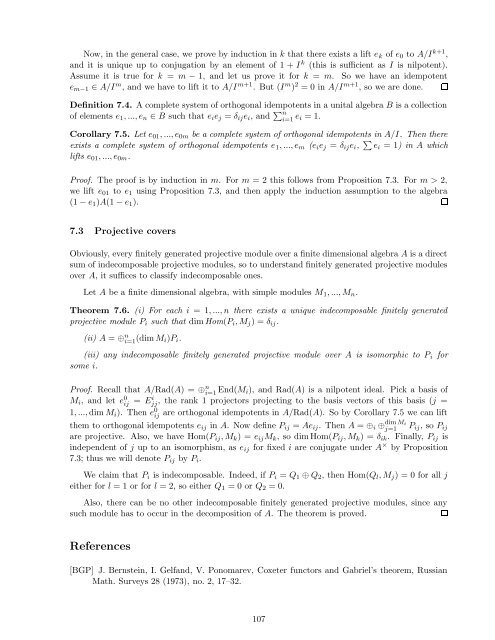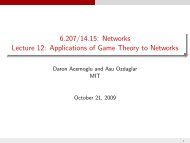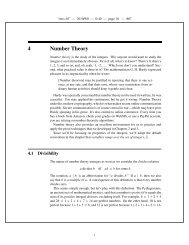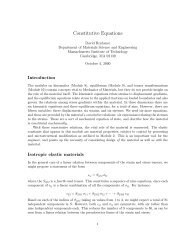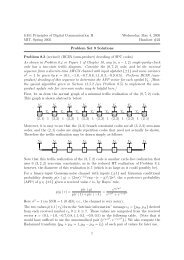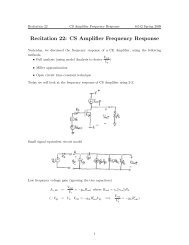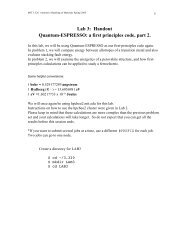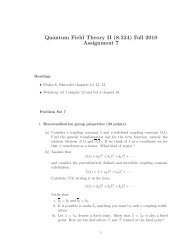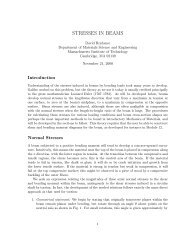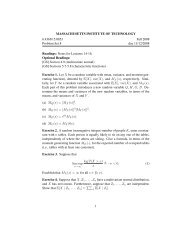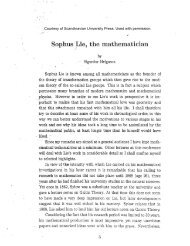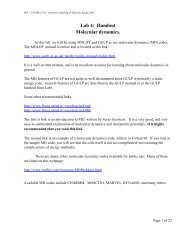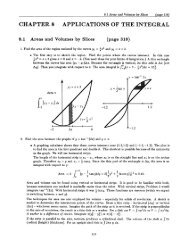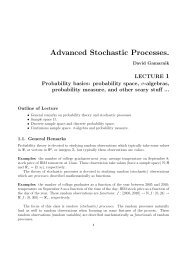Lecture notes for Introduction to Representation Theory
Lecture notes for Introduction to Representation Theory
Lecture notes for Introduction to Representation Theory
Create successful ePaper yourself
Turn your PDF publications into a flip-book with our unique Google optimized e-Paper software.
Now, in the general case, we prove by induction in k that there exists a lift e k of e 0 <strong>to</strong> A/I k+1 ,<br />
and it is unique up <strong>to</strong> conjugation by an element of 1 + I k (this is sufficient as I is nilpotent).<br />
Assume it is true <strong>for</strong> k = m − 1, and let us prove it <strong>for</strong> k = m. So we have an idempotent<br />
e m−1 A/I m , and we have <strong>to</strong> lift it <strong>to</strong> A/I m+1 . But (I m ) 2 = 0 in A/I m+1 , so we are done.<br />
Definition 7.4. A complete system of orthogonal idempotents in a unital algebra B is a collection<br />
of elements e 1 , ..., e n B such that e i e j = ζ ij e i , and ⎨ n<br />
i=1 e i = 1.<br />
Corollary 7.5. Let e 01 , ..., e 0m be a complete system of orthogonal idempotents in A/I. Then there<br />
exists a complete system of orthogonal idempotents e 1 , ..., e m (e i e j = ζ ij e i , ⎨ e i = 1) in A which<br />
lifts e 01 , ..., e 0m .<br />
Proof. The proof is by induction in m. For m = 2 this follows from Proposition 7.3. For m > 2,<br />
we lift e 01 <strong>to</strong> e 1 using Proposition 7.3, and then apply the induction assumption <strong>to</strong> the algebra<br />
(1 − e 1 )A(1 − e 1 ).<br />
7.3 Projective covers<br />
Obviously, every finitely generated projective module over a finite dimensional algebra A is a direct<br />
sum of indecomposable projective modules, so <strong>to</strong> understand finitely generated projective modules<br />
over A, it suffices <strong>to</strong> classify indecomposable ones.<br />
Let A be a finite dimensional algebra, with simple modules M 1 , ..., M n .<br />
Theorem 7.6. (i) For each i = 1, ..., n there exists a unique indecomposable finitely generated<br />
projective module P i such that dim Hom(P i , M j ) = ζ ij .<br />
(ii) A = i<br />
n<br />
=1 (dim M i)P i .<br />
(iii) any indecomposable finitely generated projective module over A is isomorphic <strong>to</strong> P i <strong>for</strong><br />
some i.<br />
Proof. Recall that A/Rad(A) = i n =1 End(M i), and Rad(A) is a nilpotent ideal. Pick a basis of<br />
M<br />
0<br />
E i i , and let e ij = jj , the rank 1 projec<strong>to</strong>rs projecting <strong>to</strong> the basis vec<strong>to</strong>rs of this basis (j =<br />
1, ..., dim M i ). Then e0 ij are orthogonal idempotents in A/Rad(A). So by Corollary 7.5 we can lift<br />
them <strong>to</strong> orthogonal idempotents e ij in A. Now define P ij = Ae ij . Then A = i dim M i<br />
P ij , so P ij<br />
j=1<br />
are projective. Also, we have Hom(P ij , M k ) = e ij M k , so dim Hom(P ij , M k ) = ζ ik . Finally, P ij is<br />
independent of j up <strong>to</strong> an isomorphism, as e ij <strong>for</strong> fixed i are conjugate under A × by Proposition<br />
7.3; thus we will denote P ij by P i .<br />
We claim that P i is indecomposable. Indeed, if P i = Q 1 Q 2 , then Hom(Q l , M j ) = 0 <strong>for</strong> all j<br />
either <strong>for</strong> l = 1 or <strong>for</strong> l = 2, so either Q 1 = 0 or Q 2 = 0.<br />
Also, there can be no other indecomposable finitely generated projective modules, since any<br />
such module has <strong>to</strong> occur in the decomposition of A. The theorem is proved.<br />
References<br />
[BGP] J. Bernstein, I. Gelfand, V. Ponomarev, Coxeter func<strong>to</strong>rs and Gabriel’s theorem, Russian<br />
Math. Surveys 28 (1973), no. 2, 17–32.<br />
107


